Okay, I admit it—I’m addicted to those videos that show people helping animals, creatures helping people and even animals helping one another. I like the positive energy, the inventiveness and persistence, the sheer effort exerted for another’s benefit.
Most of all, however, I appreciate the demonstrations of assistance with no reward but the knowledge of having saved a life,
We Create the Problems
The only problem, however, is that the people are often helping animals get out of situations that were created by human beings. Oh, sure, sometimes we see humans helping a deer or moose that’s trapped in the ice or swimming far away from shore.
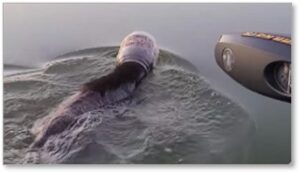 Mostly, however, the animals have suffered encounters with:
Mostly, however, the animals have suffered encounters with:
- Pollution: A bear with his head caught in a cheeseball jar, a sea turtle caught in plastic six-pack ring,
- Equipment: Whales and dolphins tangled in discarded fishing nets and trap lines.
- Fencing: Deer, elk, or even wild horses caught in barbed-wire fencing, an owl trapped a soccer net,
So many of these videos have been shared on YouTube and social media sites that it would take days to compile them all.
Killing the Whales
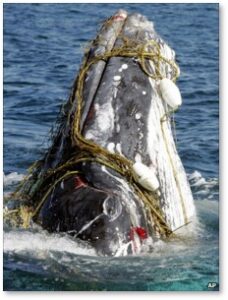 The whale rescues are the ones that really capture my attention (and too much of my time) watching them. They are not to blame for the miles of fishing lines, webs of fishing nets, ropes, and trap gear that litter the ocean after lost in storms or discarded at sea. They just swim along without understanding that those ropes will wrap around them –and what will happen then.
The whale rescues are the ones that really capture my attention (and too much of my time) watching them. They are not to blame for the miles of fishing lines, webs of fishing nets, ropes, and trap gear that litter the ocean after lost in storms or discarded at sea. They just swim along without understanding that those ropes will wrap around them –and what will happen then.
Sea mammals, being pretty intelligent, have learned that human beings can help them with this problem. Whether they understand that human beings have created the problem appears less obvious. Not infrequently, they come to our boats or approach divers to seek help from nimble human hands. Fortunately, people have often been able and willing to help.
Cetacean Gratitude
The people who have freed these marvelous creatures often report that the whales seem to be thanking them. Well, why not? On Saturday, we heard a radio program about men who had freed a humpback whale with heavy crab pots and line wrapped around her, dragging her down. She could barely keep her head above water to breathe and was exhausted from the effort.
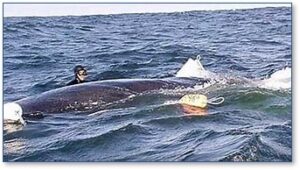 The men worked for hours, cutting away the ropes and nets until she was free. Afterward, when she might just have swum away, she went instead to every one of the men and their boats repeating a set of behaviors that included three head bumps. The radio show was all about whether this “animal” was really capable of expressing gratitude.
The men worked for hours, cutting away the ropes and nets until she was free. Afterward, when she might just have swum away, she went instead to every one of the men and their boats repeating a set of behaviors that included three head bumps. The radio show was all about whether this “animal” was really capable of expressing gratitude.
Really. Whales are intelligent, they have language and songs, they live in close family groups and care for one another. Mother whales have demonstrated grief over the death of a calf. Why is it so difficult for human beings to acknowledge that such a creature can express gratitude? Is it because we don’t speak whale? (Not that we seem to have made much of an attempt to do so.) Or is it because we just like to think of ourselves as superior beings capable of elevated emotions that are beyond God’s lesser creations?
Animals Helping Humans
It happens less often that animals can help humans. After all, we have those clever hands and nimble fingers that can do so many things beyond the abilities of paws, claws, hooves, and horns. What animals have in their favor is strength.
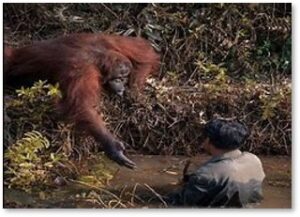 Dogs and cats, as well as other pets, have saved many lives, by warning their humans of danger, snatching children from harm’s way, and leading us to humans in distress. But wild animals have been recorded assisting people as well.
Dogs and cats, as well as other pets, have saved many lives, by warning their humans of danger, snatching children from harm’s way, and leading us to humans in distress. But wild animals have been recorded assisting people as well.
I love the video of an orangutan in Borneo stretching out its long arm to help a man who was standing in snake-infested water. The Man of the Forest might well have assumed that the human was in danger, trapped among the snakes. In fact, he was clearing the snakes out of the water to keep the orangutans safe.
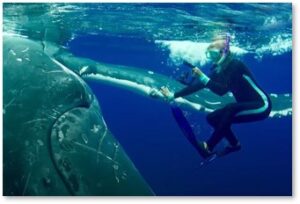 A whale once did its best to protect a diver from a tiger shark. The woman did not understand why the whale was nudging her away from the area she wanted to swim to, pushing her out of the water, and blocking her path. Until she saw the shark. Then it became clear to her that the whale was trying to protect her, as it would a calf in its pod.
A whale once did its best to protect a diver from a tiger shark. The woman did not understand why the whale was nudging her away from the area she wanted to swim to, pushing her out of the water, and blocking her path. Until she saw the shark. Then it became clear to her that the whale was trying to protect her, as it would a calf in its pod.
Animals Helping Animals
These really intrigue me. Why would one animal help one of a totally different species? What’s in it for them? Clearly, nothing. Perhaps they simply empathize with another creature and try to stop it from being killed.
Why would a rooster and a goat team up to save a chicken from a hawk’s attack? Did they consider the chicken a part of their farmyard team? The rooster I can understand—that chicken belonged to his flock—but the goat had no skin in this game. Yet, in he charged in to do his part.
Why would a hippopotamus attack a crocodile to save an antelope? Hippos and crocs don’t compete for food. Is this an altruistic act or do hippos just hate crocodiles? We will probably never know.
Dangerous Mercy
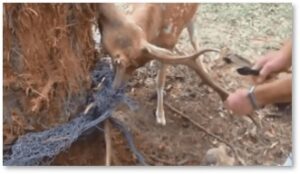 Helping animals in distress can be dangerous, of course and such an attempt must be undertaken with great care. Any terrified animal will flail about, bite, or sting.
Helping animals in distress can be dangerous, of course and such an attempt must be undertaken with great care. Any terrified animal will flail about, bite, or sting.
A trapped and vulnerable animal is unlikely to think that humans are coming to rescue it and struggle even harder to escape. Even the men who freed the humpback whale said that she raised one 15-foot pectoral fin in a threatening way when they first approached.
A creature in trouble might not understand that you’re trying to free it. Predators like bear and cougar present obvious dangers. Even deer have sharp hooves and stags have pointed antlers. With birds, there are talons and beaks to consider.
Backing One Another Up
Even so, it gives me faith in human and animal nature to think that we will still help one another in a crisis. Animals, after all, have no politics and no prejudices. They only want to get through their day with a full stomach and without becoming any other animal’s dinner. Most of the time, they avoid humans altogether.
But danger can make for strange friends. Do animals understand that we’re all in this together better than humans do? There’s a thought.
Given the dangers we all face from wildfire, flood, high winds, and other natural disasters, it’s nice to know that we can all watch one another’s backs, so to speak.
